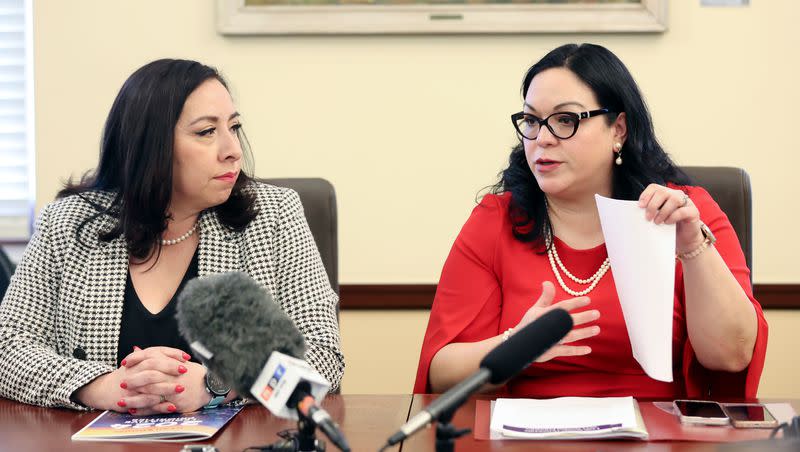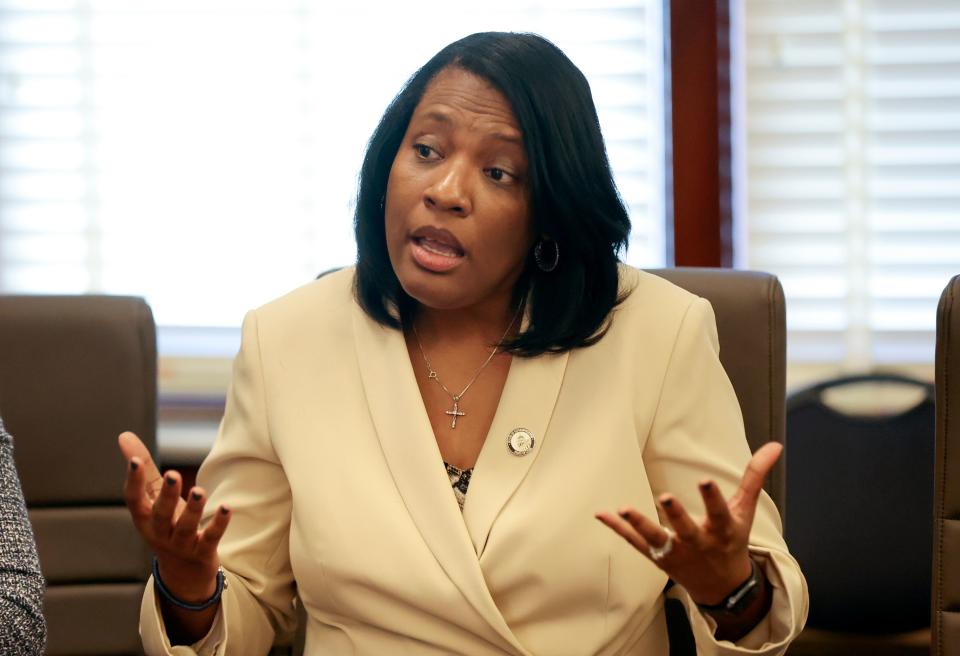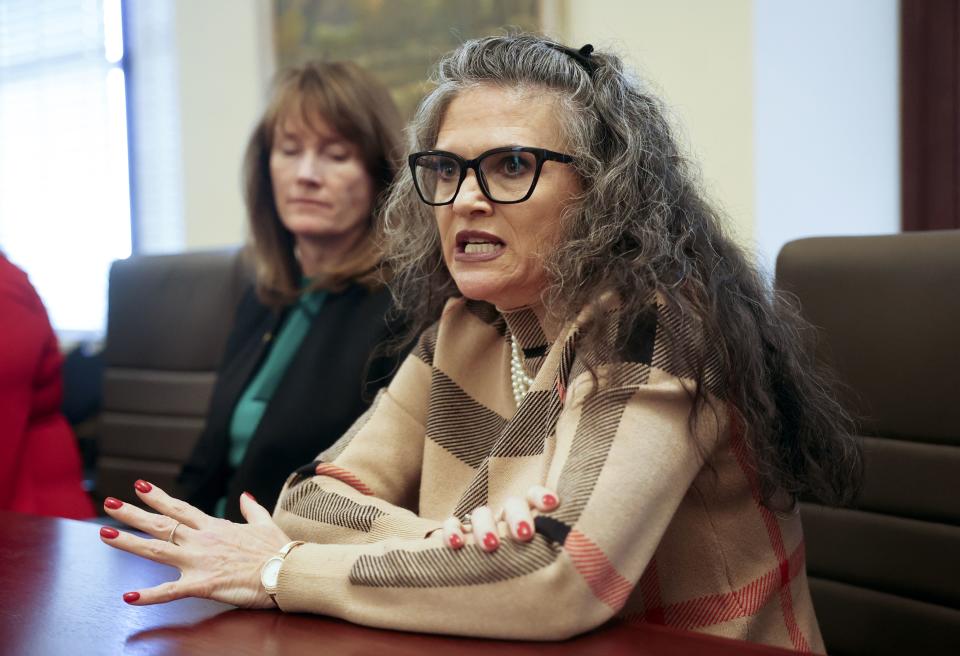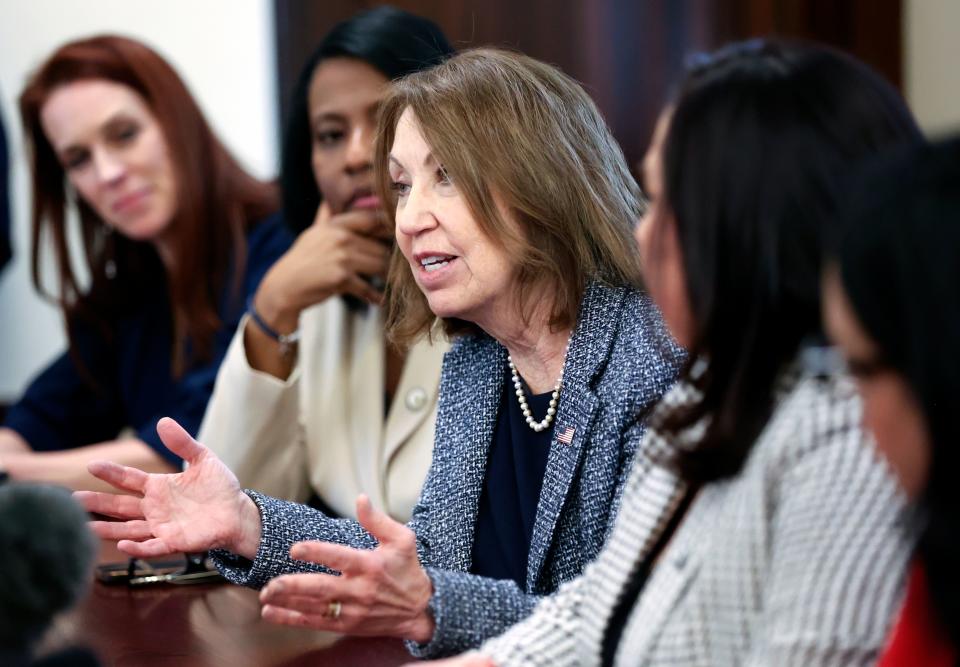Utah Democratic lawmakers respond to DEI ban, transgender bathroom bill

- Oops!Something went wrong.Please try again later.
Democratic leadership in the Utah House and Senate decried the “unintended consequences” of a Republican proposal to overhaul diversity, equity and inclusion programs at public institutions on Tuesday.
They also made a pitch for civility during what’s promising to be a contentious session.
Speaking on the first day of the 45-day legislative period, the heads of Utah’s minority caucuses pushed back against the state’s supermajority, criticizing GOP bills dealing with hot-button issues, like limiting DEI initiatives and transgender access to bathrooms in government-owned facilities, as overly broad and insensitive to vulnerable populations.
“My concern is the overall impact that it is going to have on different groups that have been able to come together to support themselves in the school system,” said House Minority Assistant Whip Sandra Hollins, D-Salt Lake City, during an opening day media availability.
Related
Beyond disagreeing with their conservative colleagues, House Minority Leader Angela Romero, D-Salt Lake City, and Senate Minority Leader Luz Escamilla, D-Salt Lake City, put forward their 2024 general session priorities, which touched on access to health care, responsible growth and education.
But Utah’s Democratic leadership also expressed worry about the ability of the minority, and the public, to influence the process as Republican lawmakers look to move forward on controversial legislation as quickly as possible.
What Democrats say about the Republican DEI bill in Utah
The bill seeking to curb certain DEI programs in public entities, “Equal Opportunity Initiatives,” or HB261, was introduced by the bill’s sponsor, Rep. Katy Hall, R-Ogden, and Sen. Keith Grover, R-Provo, on Jan. 11. It will be brought up for consideration by the House Education Standing Committee on Wednesday.
According to Hall and Grover, their legislation would prohibit “discriminatory” DEI practices, like requiring diversity statements in job applications, would reaffirm institutional neutrality on college campuses and would fund student success centers that avoid differential treatment among students.

Hollins, who spoke out against efforts to ban DEI initiatives last year, said Hall’s bill sends a message to Utahns of color that their safety in schools is not a priority for state lawmakers. Prohibitions on DEI trainings, programs and offices that don’t meet the bill’s criteria may also have a chilling effect, she said, “tying our teachers’ hands to be able to have open conversation and talk about different things.”
While Romero and Escamilla confirmed they had multiple opportunities to meet with the bill’s authors prior to the session, they said they were unable to read the bill until it was made public. Upon reading the legislative text, they discovered language that encompassed “government entities” in addition to institutions of higher education.
“What toll will that take on local and county government?” Romero asked.
Romero said the legislature’s habit of quickly pushing through impactful legislation precludes engagement from Democratic lawmakers and Utah residents.
“This is why people feel like they don’t have a voice anymore,” she said.
Democrats respond to GOP transgender bathroom bill
Democratic leadership also took the opportunity to respond to another bill that is gearing up to be one of the most contentious of the session.
Rep. Kera Birkeland, R-Morgan, who passed a law in 2022 banning transgender girls from participating in female school sports, introduced legislation on Jan. 11 that narrowly defines “male” and “female,” and prohibits anyone from using a gender-designated restroom or locker room that doesn’t match their sex in a publicly-owned facility, unless they have legally changed the sex on their birth certificate and “undergone a primary sex characteristic surgical procedure ... to correspond with the sex designation of the privacy space.”
The bill, HB257, would also require that taxpayer-funded buildings provide more unisex or single-occupant restrooms to increase privacy for all individuals.

Senate Minority Assistant Whip Jen Plumb, D-Salt Lake City, took issue with the bill’s focus on one minority group in the name of privacy, saying if privacy is the problem then legislators should pass her bill, SB105, which would guarantee that all students have privacy in changing rooms in public facilities.
Plumb said “there was zero room for compromise on the issue” of allowing transgender youth to use the bathroom of their choice. House Minority Whip Jennifer Dailey-Provost, D-Salt Lake City, said the bill “is the exact opposite of civility” because it frames the discussion around an “arbitrary medical definition of what gender is.”
“That is shutting down conversation based on some false narrative that any person fits into a box,” Dailey-Provost said.
Birkeland’s bill defines “female” as “the characteristic of an individual whose biological reproductive system is of the general type that functions to produce ova.” HB257 will be considered by the House Business and Labor Standing Committee on Wednesday.
Related
Can Utah lawmakers stay civil this session?
With lawmakers moving quickly on controversial issues, both Republican and Democratic leaders stressed the need to maintain civility during the session.
During morning floor time, Escamilla confessed to her fellow senators that the last couple of weeks “have been challenging, tiresome and testing for me. That led me some soul-searching and self-reflection about my role.”
But then, Escamilla said, she was reminded about the “power of process” and “the importance of hope” after talking to another senator. “I choose to continue to have faith in humanity, even when addressing difficult and sometimes painful issues.”
As a member of the Legislature’s minority party, she said she uses “civility as a pathway to get to places where we can all co-exist and be prosperous together” and pledged to “be more careful when expressing my frustrations (and) disappointments.”
Escamilla told a reporter later she was reacting to the DEI bill as well as to how immigration is being talked about by some lawmakers, calling some of what she’s heard about possibly limiting access to education “not only scary. It’s painful and it’s hurtful.”
Also on her mind, she said, is this year’s divisive national presidential election.
Related
Senate Majority Leader Evan Vickers, R-Cedar City, told senators that lawmakers are “going to be dealing with some tough issues” and talked about the importance of listening to different points of view, exercising patience and treating colleagues civilly.
“Emotions are going to be wanting to rise. We’re going to have differing opinions on things. I think that the important thing is to remember the civility, and keeping those things in balance and in check. I try hard to really control my emotions,” he said.
Vickers told reporters later that other states are seeing a breakdown in legislative decorum, with lawmakers attacking each other when they disagree on policy. He said he wants senators to keep in mind that they need to be respectful.
“I don’t know if this session is going to be any worse than any others,” the Senate majority leader said, but “the potential is always there.”

